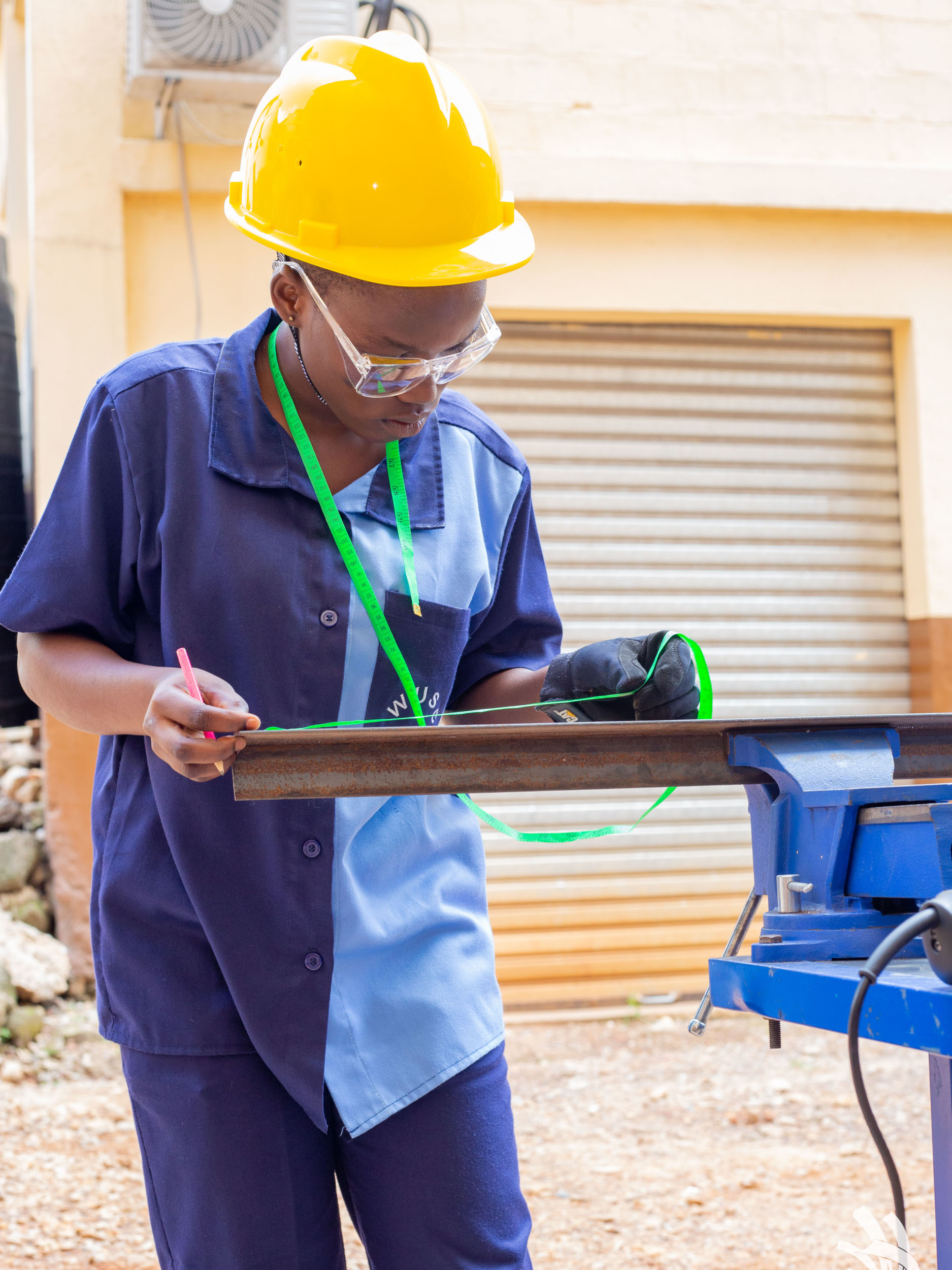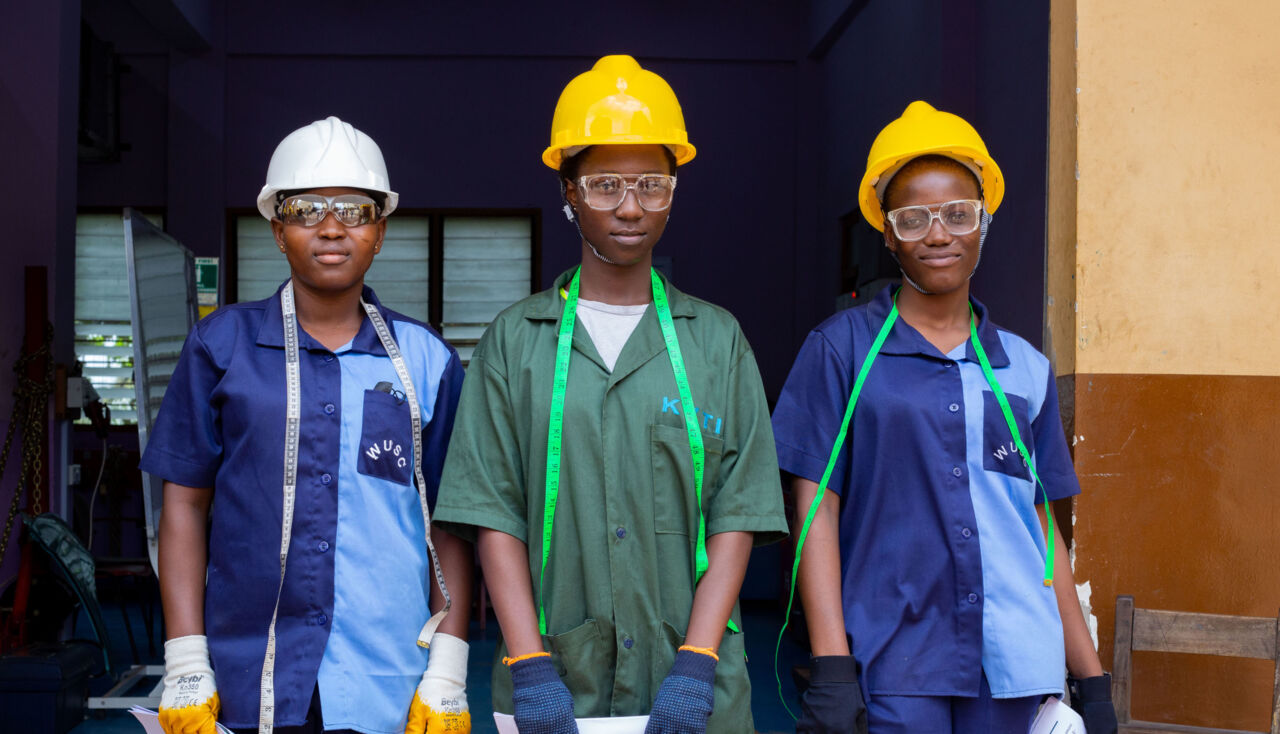This year marks five years since Ghana officially became a WorldSkills Member. The decision to join has helped the nation strengthen its relationships with industry and academia and increase the number of young people choosing Technical and Vocational Education and Training (TVET). Here’s how it happened…
Accelerating TVET enrolment by strengthening relationships with industry and academia
Ghana officially became the first West African Member of WorldSkills in 2019, but its journey began a few years earlier in 2017 when its government approved a five-year strategic plan for TVET, with key policy objectives around better governance and management of skills education, more equitable access to skills, and improved benchmarks aligned to international standards.
Ambitions were high and the timing was right. In 2017, Ghana’s economy was showing growth rates of over 8%, in agriculture more than other sectors. Meanwhile, Ghana’s youth population was expanding with nine out of ten children attending school, one of the highest rates in Africa. At this time, Ghana’s youth represented an exciting pool of talent to transform existing industries and accelerate new ones. Skills development was critical and WorldSkills would play a key role.
Joining the WorldSkills community offered three clear benefits:
- It would give the country instant access to knowledge across the membership
- It would provide Ghana with a visible brand around which it could rally support
- It would set new standards for skills excellence across Ghana’s industries and education system
To start the journey, Ghana made an early fact-finding mission to WorldSkills Abu Dhabi 2017 to see an WorldSkills Competition in action, observe the standards of skills across the world, and learn how it might stage its own competition and educational conference. The visit inspired Ghana to begin the process of becoming an official Member, starting with a national event of its own.
So, in 2018, it held a national “trial” competition. The nationals were supported by Deutsche Gesellschaft für Internationale Zusammenarbeit (GIZ) and subsequently Worldskills Germany who have provided mentorship, helped build the capacity of Experts and judges, and aided the design of those competition test projects that would be of most value to Ghana’s industrial growth. Its inaugural competition launched under the banner of “Skills for jobs and national development”. At that very first event, 200 people applied and 78 were selected to compete. Five of those went on to represent their country at WorldSkills Africa Competition in Kigali, Rwanda, securing a gold medal for Cooking, silver in Hairdressing and Mechatronics, and bronze in Electrical Wiring.
Then, in just five years, WorldSkills Ghana saw competition application numbers rocket up. More than 950 skilled young people applied to compete at the nationals in 2020/21 with 73 selected. Then, in 2023, over 4,000 applied to take part and so far 105 have been selected to compete in the nationals being held in March and April 2024. The nation has continued to enjoy medal success at a regional level too, bringing home four medals from WorldSkills Africa 2022 Swakopmund - two gold medals in IT Software Solutions for Business and Mechanical Engineering CAD, and two silver medals in Fashion Technology and Electrical Installation.
Yet it was not just young students who flocked to be part of this supercharged skills programme. Industry leaders and educators were also drawn to the renewed energy behind Technical and Vocational and Technical Education (TVET) in Ghana. And as a dynamic, youth-centred brand, WorldSkills gave Ghana a new engaging platform to talk about skills and elevate the socio-economic importance of TVET.

Albert Opare is Head of Corporate Affairs at the Commission for Technical and Vocational Education and Training (CTVET) and part of the WorldSkills Ghana operational team. He describes the WorldSkills brand as a unifying symbol, “We already had strong governmental, industry, and academic connections, and we used these foundations as a springboard. But it was WorldSkills that gathered our connections under a single identity. WorldSkills provided a degree of neutrality that ensured everyone stood on an equal footing.”
As momentum grew around skills, Ghana was declared a WorldSkills Member at the WorldSkills General Assembly in June 2019, in time to compete at WorldSkills Kazan 2019. Its official induction into the WorldSkills community proved to be another important leap forward in its skills journey because it was at Kazan that Ghana saw the huge potential of the WorldSkills Occupational Standards. At the international Competition, it watched Champions from over 80 countries compete at the highest level.
The experience was eye-opening Albert recalls, saying, "For Ghana, there was a strong sense of not wanting to be left behind. When we returned [from Kazan], we found that our industries were more prepared than anticipated to adapt and meet the WorldSkills Occupational Standards. Local industry players swiftly realized the necessity for improvement, and they responded to the challenge.”
The WorldSkills Occupational Standards have helped WorldSkills Ghana establish industry-wide benchmarks for skills excellence and embed new standards into school and college curricula. And with support from WorldSkills Members like WorldSkills Germany, as well as WorldSkills International, it has applied those same standards to build the capacity of trainers across the country from the ground up.
So what impact has this all had?
Relationships with industry have become stronger and closer, ensuring that investment in skills matches the talent and technologies to aid Ghana’s economic growth. More businesses are keen to align themselves to WorldSkills Ghana, joining businesses like Kersl Automation which has been sponsoring the Mechatronics skills competition since the very beginning and continues to work with the team five years on.
The same can be said about links with education. Members of WorldSkills Ghana’s Experts Faculty have been invited to join Ghana’s 22 Sector Skills Bodies, established by the Ministry of Education (through CTVET) to help bridge the gap between the industry and academia. It has proved to be an essential vehicle to bring together private sector, professional bodies, government institutions, and education and training institutions and has a clear focus on the exploration of business opportunities, innovation and capacity needs within the sectors.

Skills have also become more visible. In 2021, for the first time, the WorldSkills Ghana national skills competition was held in a school so that students could be part of the atmosphere and see the Competitors in action. It gave them greater access to skills, inspiration for their own education and careers, and a chance to witness the huge variety of people involved in skills development – from those competing, to those speaking at the conference and joining the audience. Albert reflects on how powerful this was for young people. He says, “For years, science and mathematics had its own national competition in Ghana, and VET felt like an afterthought. WorldSkills Ghana challenged that by placing young people at the heart of a collaborative platform and giving them a voice.”
Most importantly, WorldSkills Ghana is proudly reporting a rise in applications to its TVET colleges. Before its first national skills competitions, enrolment in free VET institutions was around 27,000. In 2021/2022 this soared to 40,800, and in 2022/2023 this rose further to over 50,000. A phenomenal impact in just five short years and a great foundation to build a more skilled and prosperous Ghana, now and in the future.